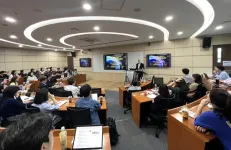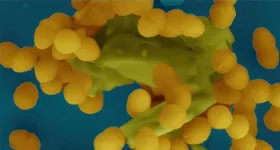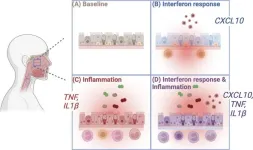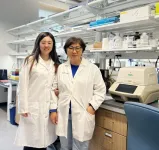(Press-News.org) The earlier a cancer is detected, the better the chances that treatment will be effective. This applies to almost all types of cancer. Another crucial element in successfully treating patients is to individually assess the benefits and risks of individual forms of therapy and to regularly monitor treatment success. To do this, oncologists have a range of methods at their disposal, most notably imaging technology and invasive measures such as tissue biopsies, punctures and endoscopic procedures.
Analyzing gene fragments in the bloodstream
Researchers at the University of Zurich (UZH) and the University Hospital Zurich (USZ) have now further developed an advanced method, a type of liquid biopsy that analyzes blood samples rather than organs or tissues. The method sequences and analyzes DNA fragments circulating in the blood of patients. “Our method can be used in the future for risk assessments, treatment monitoring during follow-up care and early detection of cancer recurrence, in principle for all types of tumors,” says Zsolt Balázs, co-first author of the study at the UZH Department of Quantitative Biomedicine.
Since the method is based on blood samples, it is less invasive than performing tissue biopsies, for example. Moreover, taking blood samples is fast and more practical in day-to-day hospital operations, as fewer appointments for diagnostic interventions are needed, sparing those affected lengthy waits.
Tailor-made treatment approach
The new method for analyzing liquid biopsies can help oncologists to more accurately determine tumor activity and spread. This will enable them to develop therapies that are tailored to individual patients. “We can see earlier and more quickly how much the cancer has spread in the body and how well a patient is responding to a specific treatment, or whether there will be a relapse,” says Zsolt Balázs.
In the lab, the researchers analyzed the gene fragments circulating in the blood for changes in the DNA that are characteristic of the specific type of cancer. The method analyzed alterations in the number and length distribution of the fragments. “The liquid biopsy technique enables us to discriminate between biologically less and more aggressive metastatic cancer disease – perhaps even earlier than using imaging technology,” says co-first author Panagiotis Balermpas, a professor at the Department of Radiation Oncology at USZ.
Increased focus on patients’ quality of life
The researchers tested their method on patients undergoing radiotherapy, including several HPV-positive patients. HPV stands for human papillomavirus, which can also cause cancer. The number of HPV DNA fragments found in the blood allowed the researchers to observe the development of tumors. For head and neck cancer, they found that a higher concentration of HPV DNA might be an early indication of cancer recurrence, which could be combated using immunotherapy.
“The more a tumor metastasizes, the poorer the patient’s quality of life. This also applies to local recurrences that aren’t detected early. It is key that we individualize treatment as far as possible, taking into account the potential benefits of all therapies as well as their influence on the patient’s quality of life,” concludes Balermpas, who oversaw the treatment of patients with head and neck tumors in the study.
END
Novel blood test helps improve cancer treatments
Oncology
2024-07-01
ELSE PRESS RELEASES FROM THIS DATE:
Research-driven Korea University College of Medicine promotes joint research with global scholars
2024-07-01
Korea University's College of Medicine (Dean Pyun, Sung Bom) hosted the 1st Research Nexus Program in order to enhance international research network cooperation and vitalize global joint research.
This program shares the latest research trends and aims to invigorate international joint research by opening a seminar inviting top global scholars to promote international research performances.
The 1st program held an invitation seminar of Prof. Jeffrey D. Macklis, the "global authority in the field of neurogenesis" (Department of Stem Cell and Regenerative Biology at Harvard University).
Prof. Macklis ...
Degradation of cell wall key in the spread of resistance
2024-07-01
A study at Umeå University, Sweden, provides new clues in the understanding of how antibiotic resistance spreads. The study shows how an enzyme breaks down the bacteria's protective outer layer, the cell wall, and thus facilitates the transfer of genes for resistance to antibiotics.
"You could say that we are adding a piece of the puzzle to the understanding of how antibiotic resistance spreads between bacteria," says Ronnie Berntsson, Associate Professor at Umeå University and one of the authors behind the study.
The Umeå researchers have studied Enterococcus faecalis, which is a bacterium that often ...
The evidence is mounting: humans were responsible for the extinction of large mammals
2024-07-01
The debate has raged for decades: Was it humans or climate change that led to the extinction of many species of large mammals, birds, and reptiles that have disappeared from Earth over the past 50,000 years?
By "large," we mean animals that weighed at least 45 kilograms – known as megafauna. At least 161 species of mammals were driven to extinction during this period. This number is based on the remains found so far.
The largest of them were hit the hardest – land-dwelling herbivores weighing over a ton, the megaherbivores. Fifty thousand years ago, there were 57 species of megaherbivores. Today, only 11 remain. These remaining ...
Common respiratory infections may have protected children from COVID-19, study suggests
2024-07-01
Analyzing nasal swabs taken during the pandemic, researchers at Yale School of Medicine suggest that the frequent presence of other viruses and bacteria may have helped to protect children from the worst effects of COVID-19 by boosting their immune systems. Their results will be published July 1 in the Journal of Experimental Medicine (JEM).
Children are generally more susceptible than adults to respiratory infections such as the common cold, and yet, for unknown reasons, the SARS-CoV-2 virus tends to cause less severe ...
Ochsner Medical Center – Baton Rouge performs robotic-assisted lung biopsy
2024-07-01
BATON ROUGE, La. – Ochsner Medical Center – Baton Rouge now offers robotic-assisted bronchoscopy using the Ion robotic platform, a new, minimally invasive option for lung biopsy.
With bronchoscopy, doctors insert a long, thin tube with a camera to examine lung tissue and retrieve a biopsy sample. The Ion robot enables doctors to perform a biopsy quicker and safer than ever before.
These advancements are especially critical for treating lung cancer, since early detection is key to achieving the best outcome. Every six weeks of delayed treatment lowers ...
Daily sauna time might help prevent menopause-related weight gain
2024-07-01
Chicago (July 1, 2024) — New research performed with mice suggests that daily time in a warm environment such as a sauna might help older adults, especially women, combat age-related obesity and insulin resistance. The study shows the potential of heat treatments as a simple way to promote healthier aging.
The researchers found that older female mice receiving a daily 30-minute whole-body heat treatment gained less weight and showed improved use of insulin, which helps control blood sugar. The investigators ...
Researchers thwart resistant bacteria’s strategy
2024-07-01
Antibiotic resistant bacteria are experts in evolving new strategies to avoid being killed by antibiotics.
One such bacterium is Pseudomonas aeruginosa, which is naturally found in soil and water, but also hospitals, nursing homes and similar institutions for persons with weakened immune systems are home for strains of this bacterium. As many P. Aeruginosa strains found in hospitals are resistant to most antibiotics in use, science is forced to constantly search for new ways to kill them.
Now, at team of researchers from Department of Biochemistry and Molecular Biology and Department of ...
Finding the sweet spot in brain development
2024-07-01
Not everything in the brain is meant to last. As our brains assemble, trillions of neural connections have to be built or torn down at the right time and place. Otherwise, the seeds of disorders like autism can take root. Cold Spring Harbor Laboratory Assistant Professor Gabrielle Pouchelon studies how the brain is wired early in life. In doing so, she hopes to find the origins of various brain dysfunctions and new ways to treat them.
In a new study, Pouchelon and her team zero in on a process known as pruning. This is when the brain removes unnecessary connections between ...
New national volunteer leaders to guide American Heart Association into second century
2024-07-01
DALLAS, July 1, 2024 — The American Heart Association, celebrating 100 years of lifesaving service as the world’s leading nonprofit organization focused on heart and brain health for all, has named its volunteer leadership for fiscal year 2024-25. Keith Churchwell, M.D., FAHA, serving as the new volunteer president, and Marsha Jones, continuing a two-year term as volunteer board chairperson, will help guide the Association as it enters its second century. Churchwell and Jones are long-time volunteer leaders for ...
Geological Society of America reduces student membership dues to $25
2024-07-01
FOR IMMEDIATE RELEASE
1 July 2024
The Geological Society of America
Release No. 24-06
Contact: Jason Elkins
+1-303-357-1026
jelkins@geosociety.org
Boulder, Colo., USA: The Geological Society of America (GSA) is excited to announce a significant reduction in membership fees for students. Effective 1 July 2024, undergraduate and graduate students majoring in geology or related sciences can sign up for an annual student membership for just $25. This initiative underscores GSA's commitment to supporting the next generation of geoscientists by making membership more accessible and affordable.
The ...
LAST 30 PRESS RELEASES:
Trapping light on thermal photodetectors shatters speed records
New review highlights the future of tubular solid oxide fuel cells for clean energy systems
Pig farm ammonia pollution may indirectly accelerate climate warming, new study finds
Modified biochar helps compost retain nitrogen and build richer soil organic matter
First gene regulation clinical trials for epilepsy show promising results
Life-changing drug identified for children with rare epilepsy
Husker researchers collaborate to explore fear of spiders
Mayo Clinic researchers discover hidden brain map that may improve epilepsy care
NYCST announces Round 2 Awards for space technology projects
How the Dobbs decision and abortion restrictions changed where medical students apply to residency programs
Microwave frying can help lower oil content for healthier French fries
In MS, wearable sensors may help identify people at risk of worsening disability
Study: Football associated with nearly one in five brain injuries in youth sports
Machine-learning immune-system analysis study may hold clues to personalized medicine
A promising potential therapeutic strategy for Rett syndrome
How time changes impact public sentiment in the U.S.
Analysis of charred food in pot reveals that prehistoric Europeans had surprisingly complex cuisines
As a whole, LGB+ workers in the NHS do not experience pay gaps compared to their heterosexual colleagues
How cocaine rewires the brain to drive relapse
Mosquito monitoring through sound - implications for AI species recognition
UCLA researchers engineer CAR-T cells to target hard-to-treat solid tumors
New study reveals asynchronous land–ocean responses to ancient ocean anoxia
Ctenophore research points to earlier origins of brain-like structures
Tibet ASγ experiment sheds new light on cosmic rays acceleration and propagation in Milky Way
AI-based liquid biopsy may detect liver fibrosis, cirrhosis and chronic disease signals
Hope for Rett syndrome: New research may unlock treatment pathway for rare disorder with no cure
How some skills become second nature
SFU study sheds light on clotting risks for female astronauts
UC Irvine chemists shed light on how age-related cataracts may begin
Machine learning reveals Raman signatures of liquid-like ion conduction in solid electrolytes
[Press-News.org] Novel blood test helps improve cancer treatmentsOncology





